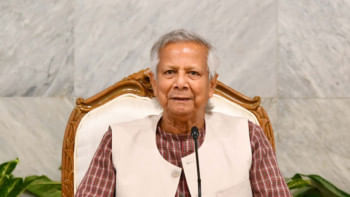LTTE tries Kamikaze attack on Colombo
Tamil Tigers carried out a kamikaze-style attack in Sri Lanka's capital on Friday night, smashing a light aircraft into the main tax building, killing at least two people and wounding 50, officials said.
Tiger rebels said yesterday the two planes they sent on a daring air attack over Sri Lanka's capital were on a kamikaze mission and were not shot down.
Authorities pulled the wreckage of one plane out of a government high-rise office building near air force headquarters in the middle of the city. The second plane crashed near an air force base just outside the international airport north of Colombo.
The rebels said the planes intentionally crashed as part of a suicide attack targeting the two air force installations and characterised the raid as a success, according to the rebel-affiliated TamilNet Website.
The Website showed a photo of the two pilots posing with rebel leader Velupillai Prabhakaran, a tradition for those about to carry out suicide attacks. It described them as members of the "Black Air Tigers." The Black Tigers is the name for the rebels suicide squad.
Earlier Sri Lanka's military said Saturday it averted a major disaster in the capital Colombo by knocking out two Tamil Tiger light aircraft packed with explosives before they could hit their intended targets.
Lankan air force said anti aircraft guns shot down one of the light aircraft that had flown over the tightly-guarded capital while the remains of the second was found inside the Inland Revenue building, which caught fire.
Witnesses said the wreckage was on the 13th floor suggesting that the bomb-laden light aircraft had crashed into the tax office in a kamikaze-style attack.
"We have found a blown off arm of the pilot on an upper floor," an air force officer told reporters at the scene. He said a few pieces of the wreckage were found and they believed the aircraft had been carrying at least two bombs.
The Tigers were believed to operate five Czech-built Zlin-143 aircraft smuggled into the island in pieces and re-assembled.
The country's only international airport was shut down briefly and flights diverted to neighbouring India as rebel planes violated the country's airspace, officials said.
Air force spokesman Janaka Nanayakkara said gunners had brought down one of the light aircraft near the international airport where the military maintains its main air bases.
"As one of the Tiger planes was fleeing, it was shot down near Katunayake," Nanayakkara said, adding that the body of a Tiger pilot had been recovered by troops.
Military spokesman Udaya Nanayakkara said the Tigers had bombed the main tax office, which caught fire. Several floors of the building were gutted. The office is located close to a luxury hotel, but there were no reports of foreign nationals among the casualties.
Residents in Colombo said they heard blasts shortly after the military ordered a blackout on Friday evening, plunging the capital and its half-a-million inhabitants into darkness as part of the air defence system.
Anti-aircraft batteries then began firing into the night sky.
Military officials said they had tracked two aircraft of the Liberation Tigers of Tamil Eelam (LTTE), operating out of a narrow strip of land still under their control in the north-east of the island.
The military has captured six out of the seven airstrips used by rebels, but security forces have -- until now -- not taken any of their aircraft.
The last Tiger air strike in the capital was in October 2008 when they bombed a power station, but did not cause any casualties.
In September they hit a military base in the north of the island causing considerable damage and killing a dozen security personnel.
The latest air strike came as government forces claimed they had destroyed the conventional fighting capability of the Tigers. Troops earlier Friday took another village from the rebels who have lost over 98 percent of the territory they controlled two years earlier.
Tens of thousands of people have died since the Tigers launched a campaign in 1972 to carve out a homeland for minority Tamils in the majority Sinhalese island's north and east.

 For all latest news, follow The Daily Star's Google News channel.
For all latest news, follow The Daily Star's Google News channel. 



Comments